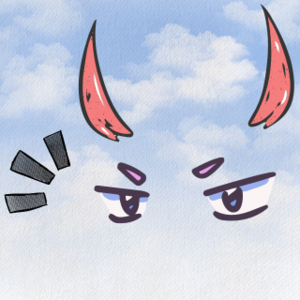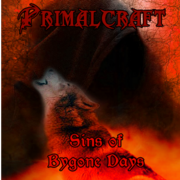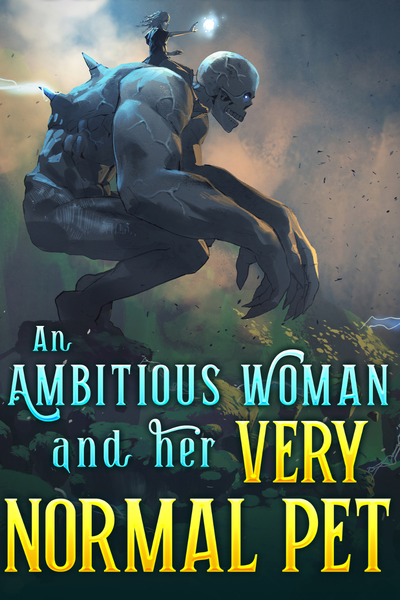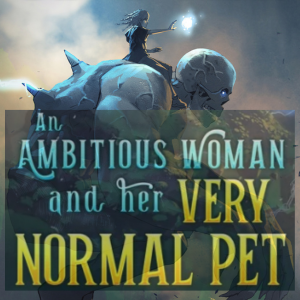Tols, or short for Tolstoy, as he comes to tell me, does not leave my side the remainder of the trip. He is accompanied by a beastman occasionally, and before long, the whole group of beastman has made our corner of the prison-wagon their own. Tols does not stop talking. At first this is irritating to me. The sun beats down on us through the bars of the cart, and my backside hurts from being immobile for so long, and his high-pitched, rough voice grates on my last nerve. But as the trip carries us into the mountains, it gives my brain something to anchor itself to. I find myself even enjoying his light anecdotes and stories.
He tells me about his home; his family, including a great many siblings; and the jobs he used to do. He used to carry mail to the neighboring towns, he tells me proudly. Sometimes he would be on foot, other times he would ride along on wagons like we were now – though I sincerely doubted he meant prison wagons – and then in the towns he’d visit, he would pick up other odd-gigs. Helping old ladies with their errand-running mostly, from the sound of things.
He seemed to take these jobs very seriously, from watering plants to scaling trees for childrens’ kites, and even getting people’s medications.
That one caught my attention, but he quickly moved away from it. I lost my chance to politely ask if he meant illicit drugs or apothecary wares.
“Where do you think they’re taking us?” I ask at one point during the road trip.
“To our deaths,” Nicholas, the feline beastman moans.
Tols shrugged. “I think you’re being dramatic.” He chides.
“I imagine we’re going to be deposited in Torsen by next night,” Oryx says with a shrug. “From there, they’ll take us into Reigh.”
“Why would they take us to Reigh?” I wonder aloud. The north-western country to Led was known as a barren winter wasteland.
Simon clears his throat and raises a hand. “If I may?”
“Hey S-Man,” Tols gestures at him.
Simon nods at him, though I can tell he doesn’t particularly like the new title bequeathed him. “If we make it to Reigh, where slavery is legal…” his voice is low and trails off. The beastmen go pale.
“In Torsen, endenturing is commonplace,” Oryx adds, also beneath his breath.
My heart picks up in its pace. So, we’re meant to be slaves.
Or, it would be like Nicholas said and we will be executed.
For what? I still haven’t sorted. Simon hasn’t told me what he thinks he’s accused of, and I am only a traitorous sovereign. The beastmen: for existing in this world in the bodies they do.
I curse myself at that thought, realizing the gravity of it. One of the edicts I had been given to sign had said something about beastmen, and in my haste to make it through the day, I’d signed it off. Of course I’d read it, but back then, I believed that beastmen weren’t to be trusted: that they were a danger to society as a whole. How wrong I was.
When the night fell over the wagon and we were pulled off to the side of the road, I sat close to Simon. The guards were taking prisoners one at a time to do their business, and we had already been granted our relief.
“Simon?” I whispered hoarsely in the dark night. Many of the other prisoners had already laid out to sleep.
“Mmm?”
“What is it you’re in for?”
Simon hesitates. “Well.” He shrugs. “I participated in activities that are now deemed illegal by the current monarchy.”
“And that is?”
He sighs. “I commit bones to the earth.”
I frown, confused. “You’re a priest?”
He chuckles low, “That’s a summation, yes.”
My brow furrows further. “I don’t understand.”
“The rituals I was brought up with, that I was trained with–they’re necromantic in nature.”
My mouth goes dry and a lifetime of resentment floods into me. I try to bite it aside, knowing I cannot give myself away, and he continues.
“I was never of the arts, I guess you could say. But I follow the same principles when it comes to committing bodies to the next life.”
“You’re not magical?” I bite out.
“I didn’t say that,” he corrects. “I have–had a weak grasp of the mystical.” He shakes his head. “But not with the dead.”
I stare at him, puzzled. The moon casts us in a silver glow, and I can see the lines in his face stretch and crease as he chooses his next words. “When we commit the dead to the earth, there are certain rituals we must partake in to give the bones of our fallen the opportunity of choice.”
“Choice?” I wonder, my head feels pulled in three different directions. How did someone follow the rituals of the necromancers without being one themselves?
His eyes flicker up to the stars above. “All spirits have a choice, Tony. Do you know the term, ‘animism?’”
I shake my head, frowning. It sounded like something having to do with animals.
“It’s a concept that was studied by both druids and necromancers. It’s the belief that all things have spirit.”
“Like a soul?” I look down at my hands. Now that he mentions it, it sounds vaguely familiar–like something my grandfather might have taught me when I was very small. Something like all of the rocks and trees and flowers all had a spark of life very different from the next.
“Sort of, maybe not as such,” Simon shrugged. “The druids and necromancers alike believed that everything: animate or inanimate, has a right to a choice in their growth and in their death, respectively.” This doesn’t answer any of the questions that are building into a tumultuous tower in my head. I open my mouth to ask another, but he continues: “See, druids felt that there is always a choice for life, and necromancers believed that there is always a choice in death. They are two very similar sides of the same coin. For example, druids had long-standing rituals where they might offer the choice of life to seedlings in a field. Necromancers, well, we’ve had long-standing traditions of asking bones their choice in death.”
“When something is dead, they are dead,” I argue.
He nods, “Sure. But the bones can decide if it is their time as sure as the soul of the person can decide if they’d like to be recommitted to the cycle of life.”
“The cycle of life?”
He nods. “Sometimes spirit just wants rest, sometimes they’d rather be committed back to reincarnation. Sometimes they’re not ready to pass at all. That’s where necromancers get their power. They find bones that haven’t passed, they give them purpose until they are ready for the next part of their journey.”
I could not wrap my mind around the idea that the evil I had hated my entire life was politely asking for permission to raise them. “Aren’t there necromancers who don’t ask for permission?”
Simon scowls, his face constricting at harsh angles. “Said like someone from Cainern.”
I stare at my fingertips. “I grew up near the border,” I lied.
He shook his head and spat into the dirt. “No. Without spirit, without a will, there is no way for the bones to build, to live again. To be given purpose and motion.” He grips a twig so hard it snaps between his fingers. “There have been necromancers, long ago, who used bones without their permission. Sometimes, bones don’t want to be raised by a particular necromancer. Maybe their magics don’t blend together well–those have been the worst cases of Construct Frenzy.”
“Construct Frenzy?” I ask, but I can already envision it.
“Bone monsters wrecking havoc. They lose their voice, their spirit.” I shudder at the thought and he nods. “A long time ago, there was an uprising of those necromancers. It’s one of the reasons for the druidic wars.”
I know that history. “How do you stop them?”
“A great many druids rose against those necromancers, but it really took other necromancers to commit the bones back to the earth. They worked together. It effectively ended the war, once the frenzied constructs were set to rest and their necromancers put to trial.”
I stare at him, stunned. That wasn’t what I had heard.
In all the history books I’d been tutored through, the way the druidic wars ended when the necromancers pushed the druids from their land, utilizing the frenzied, giant constructs made of bone and clay, purging all druidic magic from their land. It’s why the Cainern druids were so bitter about the war. I knew that all histories had different sides and conflicting facts. The wars had happened hundreds of years ago, also, so it was difficult to root out actual facts from their oral and written tradition.
I want to ask more questions, but I know that I will only give myself away as a foreigner if I continue.
“What is it you think you’ve been accused of?” Simon asks me.
I startle at his words. I grimace. “You wouldn’t believe me if I told you.” Which wasn’t the truth, technically. I think he would believe me. I think he would believe me, and then he would hate me–and I didn’t like the idea of Simon hating me, even if we stood on opposite sides of an old feud. I respected Simon. And I think to some degree, he respected me–even if I stumbled through social foibles and had what he considered the wrong history of things.
He sniffed disapprovingly and laid down. “Well. Whatever it is, I hope they’re wrong.”











Comments (0)
See all